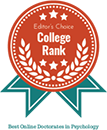
Ed.D. – Educational Psychology
Understand How Students Learn
Regent’s Doctor of Education – Educational Psychology allows for a broad area of academic inquiry with topics like psychological underpinnings of learning, cognitive strategies for learning in children and adults, creating environments conducive to learning, brain research, teacher education, faculty roles; and professional development in varied settings. You’ll be equipped to use the most appropriate and current theories and research to improve the academic and behavioral success for yourself and others while developing habits of mind that will last a lifetime.
INCREASE YOUR EARNING POTENTIAL
Capitalize on a higher salary with your doctoral degree.
USE INNOVATIVE APPROACHES
Enhance student learning by integrating technology into the learning process.
EXPAND YOUR CAREER PATH
Take your career to the next level with influential leadership opportunities.
Presented from a Christian worldview, this in-demand degree is supported by award-winning faculty in Virginia Beach.

|

|

|
On completing the Ed.D. – Educational Psychology degree, you will be able to:
- Understand the major theories in developmental psychology using select criteria.
- Examine and identify influences and shifts in cultural practices.
- Conduct guided research that contributes to the knowledge of those in school psychology, social work and counseling positions.
Career Opportunities
- University Faculty
- Curriculum & Instruction Specialist
- School District Administrator
2020-2021 Semester Check-In Deadlines:
All new students are expected to check-in for the semester 2 weeks prior to the session start date. Students should apply, be accepted, enroll in their first courses, and confirm a plan to pay for their courses prior to this date.
| Session | Semester Check-In | Session Start Date |
| Session A | Friday, August 14 | Monday, August 24 |
| Session M | Friday, September 11 | Monday, September 21 |
| Session B | Friday, October 16 | Monday, October 26 |
| Session C | Tuesday, January 5 | Monday, January 11 |
| Session T | Friday, January 29 | Monday, February 8 |
| Session D | Friday, March 5 | Monday, March 15 |
| Session E | Friday, April 30 | Monday, May 10 |
| Session F | Friday, June 11 | Monday, June 21 |
Application Process – Doctoral Programs (Ed.D.)
Note: All items submitted as part of the application process become the property of Regent University and cannot be returned.
Step 1: Application & Application Fee
Submit your application using our Regent University Online Application.
Pay the $50 nonrefundable application fee by check or money order mailed to Regent University, Enrollment Support Services, 1000 Regent University Drive, Virginia Beach, VA 23464.
Fee Waiver: Attend a graduate School of Education on-campus or online information session to learn how to streamline your application process, discover financial aid resources and waive your $50 application fee.
Note: If you are unable to complete our application due to a disability, please contact our Admissions Office and an admissions representative will provide reasonable accommodations to assist you in completing the application.
Step 2: Submit your Unofficial College Transcripts
We are able to examine and view your unofficial transcripts from U.S.-based schools, which indicate successful completion of bachelor’s and master’s degree programs, in order to review your application for an admissions decision. Please submit your unofficial transcript to our Admissions Office by email to apply@regent.edu using the subject line: SOE Doctoral Application Pieces.
Non-U.S. transcripts must be evaluated by an NACES-approved company. For further details, please review the International Admissions Checklist on the International Students Admissions page.
International Applicants: Please visit the International Students Admissions page for a more detailed explanation of the Regent University application information and to determine whether or not you qualify as an international student.
*Upon conditional acceptance to the program by review of unofficial transcripts, Regent University’s Admissions Office will attempt to obtain your official transcripts from your U.S. degree-granting institutions, which indicate successful completion of bachelor’s and master’s degree programs. We will notify you if your previous institutions will not release transcripts directly to us.
Step 3: Complete Your Admissions Questionnaire
Please complete a brief admissions questionnaire based on your professional goals and interests. This should only take a few minutes to complete, but please answer the questions completely and thoughtfully. This gives us a better opportunity to get to know you and align your objectives with our programs. The admissions questionnaire can be found here. Once completed, it will be sent directly to an admissions counselor who will be in touch with you right away to help complete the rest of your application.
Step 4: Government-Issued ID
To ensure academic integrity, Regent University requires a copy of a government-issued ID. Please email a scanned copy or photograph of it to apply@regent.edu with the subject line: Government ID.
Step 5: Admissions Interview
If an interview is necessary, the admissions office will contact you to schedule an appointment. The interview can be conducted on campus or over the phone and typically takes about an hour.
Important Information
Background Check: Students in endorsement programs are required to complete a background check because the program includes direct contact with students in field experiences. Regent University School of Education has entered into an agreement with Certified Background/Castle Branch (CB), a private vendor that conducts background checks for many universities and educational institutions. After you are admitted into the program, you will be provided instructions to set up an online profile with Certified Background and request your background check. Learn more.
2019-20 Tuition Rates
| Degree Level / Program | Cost Per Credit Hour |
|---|---|
Ed.S., Ed.D., & Ph.D. | $775 per credit (In-state & Out-of-state) |
Student Fees Per Semester
| University Services Fee (Online Students) | $550 |
| Library Orientation | $50 (one-time fee) |
| Blackboard Orientation | $50 (one-time fee) |
2020-21 Tuition Rates
| Degree Level / Program | Cost Per Credit Hour |
|---|---|
Ed.S., Ed.D., & Ph.D. | $775 per credit (In-state & Out-of-state) |
Student Fees Per Semester
| University Services Fee (Online Students) | $600 |
| Library Orientation | $50 (one-time fee) |
| Blackboard Orientation | $50 (one-time fee) |
*Rates are subject to change at any time.
Estimated Cost of Attendance: View the estimated cost of attendance to see an example of the total cost of tuition and fees.
Advanced Standing
Students possessing an Ed.S. or equivalent may be admitted to the Ed.D. program with advanced standing after a review of their post-master’s transcript(s). Offered in a cohort model. Students may begin the program in the spring, summer or fall semesters. Courses are delivered online with some required face-to-face components. School division cohorts are also offered in varying formats.
Faculty
Dr. Carr is the concentration chair for Educational Psychology and is committed to your success.
Dr. Paul Carr joined Regent University as an assistant professor of higher education administration in the School of Education in July 2000. He came from The George Washington University where he was director of the Higher Education Administration Master’s and Education Specialist programs. Dr. Carr held several positions with The George Washington University including: director of special projects, director of off-campus technology, and research assistant for Dr. Gary Confessore and Dr. Reynolds Ferrante. Additionally, he taught master’s and doctoral level courses in the Educational Technology Leadership Program, Educational Leadership Program, Human Resource Development Program and Engineering Management Program.
Carr is a member of Sigma Tau Delta and a founding fellow of Beta Phi (GWU Chapter). A native of Norfolk, Virginia, Carr attended Virginia Wesleyan College and earned a B.A. in English with minors in art and religious studies. He then earned an M.A. in Education and Human Development with a concentration in Human Resource Development and a Doctor of Education degree in Higher Education Administration at The George Washington University. His research interests include autonomous learning, human resource development, and organizational leadership.

